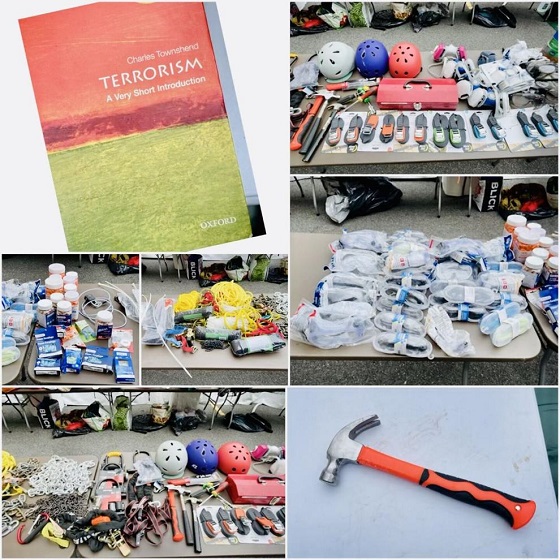espionage
The foreign interference inquiry could backfire on our national security
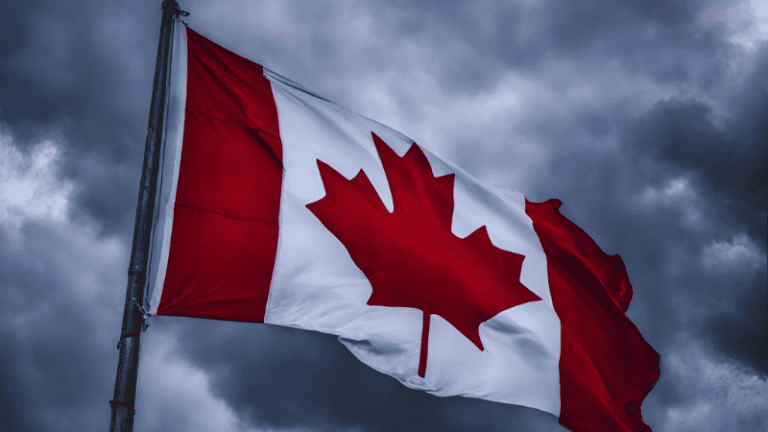
From the MacDonald Laurier Institute
By Katherine Leung and Ivy Li
Two politicians alleged by security experts to have close connections with the Chinese Consulates have been granted full standing in the inquiry by Commissioner Marie-Josée Hogue.
Canada’s public inquiry into foreign interference finally began on Monday, but unfortunately there has already been significant controversy in the months leading up to its launch. Chief among these concerns is the inquiry’s questionable ability to safeguard sensitive national security information from being used by individuals with ties to the People’s Republic of China (PRC).
Two politicians alleged by security experts to have close connections with the Chinese Consulates have been granted full standing in the inquiry by Commissioner Marie-Josée Hogue. This decision shocked many, especially communities who have been subjected to the Chinese Communist Party’s transnational repression.
Given the inclusion of these two suspect individuals, human rights activists have expressed concern for their safety if they are called to testify before the inquiry. A human rights coalition, which was also granted full standing, appealed the inclusion of the two individuals – they merely asked Hogue to downgrade the politicians’ standing status in order to protect vulnerable witnesses – but the appeal was denied.
A person who has full standing in the inquiry has the right to cross-examine witnesses and to access documentary evidence not admitted as exhibits, meaning they read and see exactly what the judge reads and sees. Knowing anything and everything the Commission has learned gives unimpeded access to sensitive and confidential information related to Canadian national security, information that is not available to parties with lesser standing.
Information gathered by the Commission will almost certainly reveal how Canadian activists and security experts monitor foreign infiltration and influence. It could expose the methodology used, contacts and information sources, and the strategic approach and rationale of each expert or analyst. Together, these bits and pieces of information will provide a detailed strategic map, exposing how Canadian authorities, non-governmental organizations, grassroots groups, and individuals have attempted to defend Canada’s sovereignty and democratic institutions. This is powerful knowledge; it is not the type of information that should be available to the perpetrators of foreign interference.
By granting standing to individuals with alleged ties to the Chinese embassy, we are potentially offering incredible insight to our adversaries, enabling them to design and execute more effective interference operations and targeted counter actions against the Canadians standing up for our national sovereignty.
Among those granted full standing are Han Dong (the Member of Parliament for Don Valley North) and Michael Chan. Dong was reported by Global News to be at the centre of China’s interference network in Canada as a “willing affiliate”. He subsequently left the Liberal caucus as he works to clear his name, and he continues to sit as an independent MP. Michael Chan, now deputy mayor of Markham, was a minister in the Ontario Liberal government from 2007 to 2018. The Globe and Mail reported that he was identified by CSIS as “too close to the Chinese consulate.” Both Dong and Chan deny these allegations.
Hogue cites the two men’s reputational interest in the Public Inquiry as a direct and substantial interest in the Commission’s work. While that is true, the question remains whether it is in Canada’s interests and appropriate to allow individuals alleged to have close ties with the PRC full access to the Commission’s evidence and records.
The Commission is not mandated to determine if individual suspects are guilty or not. The two politicians could tell their side of the story without full access to non-exhibits and without the power of cross-examination.
Canadians have demanded a public inquiry to protect Canadian sovereignty and democratic integrity. Sensitive information pertaining to Canada’s national security should be handled with the utmost caution. Han Dong and Michael Chan should not be treated as though allegations against them have been proven beyond a doubt – they have not – but the clear potential of inappropriate links to the PRC should disqualify them from accessing information that would be detrimental to our national security if it were to fall into the wrong hands.
The public inquiry meant to protect Canada’s institutions from foreign interference may end up undermining both the safety of individual Canadians and the efficacy of our broader national security apparatus.
Katherine Leung is the policy advisor for Hong Kong Watch Canada. She previously worked as a parliamentary assistant to a sitting MP.
Ivy Li is a spokesperson for Canadian Friends of Hong Kong, and a contributor to The Mosaic Effect – How the Chinese Communist Party started a hybrid war in America’s backyard.
espionage
Biden expands government’s power to spy on Americans without a warrant
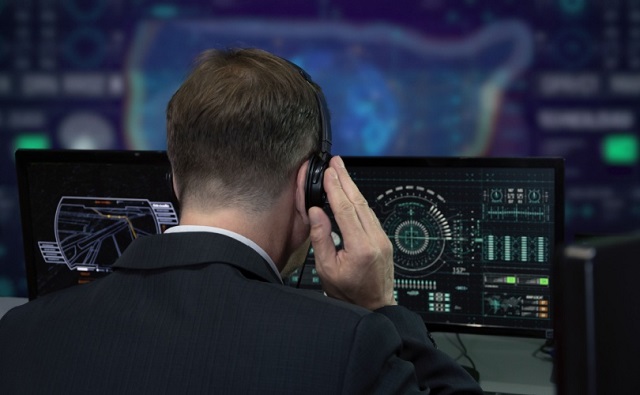
From LifeSiteNews
Legal experts have pointed out that under an updated version of the Foreign Intelligence Surveillance Act (FISA), delivery personnel, cleaning contractors, and utility providers could all be forced to surveil Americans.
U.S. President Joe Biden has quietly signed legislation reauthorizing and expanding the government’s ability to spy on American communications without a warrant.
On April 20, Biden signed the reauthorization of Section 702 of the Foreign Intelligence Surveillance Act (FISA) that allows the government to compel a broader range of businesses to collect the communications of U.S. citizens when they are in contact with foreigners, according to legal experts.
The newly passed, updated version of Section 702 accomplishes this by expanding the definition of “electronic communication service providers” who can receive FISA directives to tap communications by dropping the qualifier “communication” from electronic service providers. The new amendment, therefore, makes access merely to equipment on which communications are carried or stored enough to legally surveil Americans.
While the amendment lists types of businesses that cannot be considered Electronic Communication Service Providers (ECSPs), including public accommodations, dwellings, and restaurants, ZwillGenBlog points out that the law still allows the government to “compel the assistance of a wide range of additional entities and persons in conducting surveillance under FISA 702.”
“The breadth of the new definition is obvious from the fact that the drafters felt compelled to exclude such ordinary places such as senior centers, hotels, and coffee shops. But for these specific exceptions, the scope of the new definition would cover them — and scores of businesses that did not receive a specific exemption remain within its purview,” ZwillGenBlog explained.
The legal experts noted that among the entities that could be forced to surveil Americans under the amendment are “the owners and operators of facilities that house equipment used to store or carry data, such as data centers and buildings owned by commercial landlords,” as well as others who can access such equipment, including “delivery personnel, cleaning contractors, and utility providers.”
ZwillGenBlog also pointed out that “any U.S. business could have its communications” — if involving a foreigner — “tapped by a landlord with access to office wiring, or the data centers where their computers reside.”
Democratic U.S. Sen. Dick Durbin of Illinois had tried and failed to pass an amendment that would require government officials to obtain a warrant before spying on American communications, according to the Associated Press (AP).
“If the government wants to spy on my private communications or the private communications of any American, they should be required to get approval from a judge, just as our Founding Fathers intended in writing the Constitution,” Durbin said.
Critics of the new amendment warn that over the past year alone the FBI has unconstitutionally spied on Americans, including Republican U.S. Rep. Darin Lahood of Illinois, who serves on the Permanent Select Committee on Intelligence and the Committee on the Chinese Communist Party, as well as Americans present at or near the Capitol on January 6, 2021.
Under Section 702 of the Foreign Intelligence Surveillance Act (FISA), passed in 2008, the National Security Agency (NSA), operating inside the United States, is authorized to collect communications of foreigners overseas for foreign intelligence purposes without a warrant “because courts have held that foreigners have no Fourth Amendment rights,” according to Elizabeth Goitein.
“Although ostensibly targeted at foreigners, Section 702 surveillance inevitably sweeps in massive amounts of Americans’ communications,” Goitein further noted.
“Recognizing the impact on Americans’ privacy, Congress required the NSA to ‘minimize’ the sharing, retention, and use of this ‘incidentally’ collected U.S. person data. But the government and the FISA Court have embraced an interpretation of ‘minimize’ that is remarkably … maximal.”
“The NSA shares raw data with multiple other agencies — including the FBI and the CIA — and all of them retain the data for a functional minimum of five years. Moreover, the FBI routinely combs through it looking for Americans’ communications to use in purely domestic cases, even in situations where the FBI lacks a factual predicate to open a full investigation,” Goitein continued.
There are other means by which the U.S. government can spy on Americans. In 2022, Biden issued an executive order (EO) that allows the government to surveil Americans for broadly defined reasons including understanding “public health risks,” “political instability,” and the “threat” of climate change.
The EO was ostensibly written to “enhanc[e] safeguards” for “United States Signals Intelligence Activities,” which is intelligence gathering by the interception of signals, including communications, such as through cell phones, or those not used in communication. An accompanying fact sheet explains that the EO is meant to help “implement the U.S. commitments under the European Union-U.S. Data Privacy Framework (EU-U.S. DPF)” in an effort to “restore trust and stability” to transatlantic data flows.
Alongside permitting spying for the purposes of sizing up the capabilities of foreign entities, the EO permits signals intelligence collection for “understanding or assessing transnational threats that impact global security, including climate and other ecological change, public health risks, humanitarian threats, political instability, and geographic rivalry.”
The document’s lack of elaboration on such so-called “transnational threats” raises the question of the true scope of activity now officially subject to spying by the U.S. government, which is potentially massive.
espionage
One in five mail-in voters admitted to committing voter fraud during 2020 election: Rasmussen poll
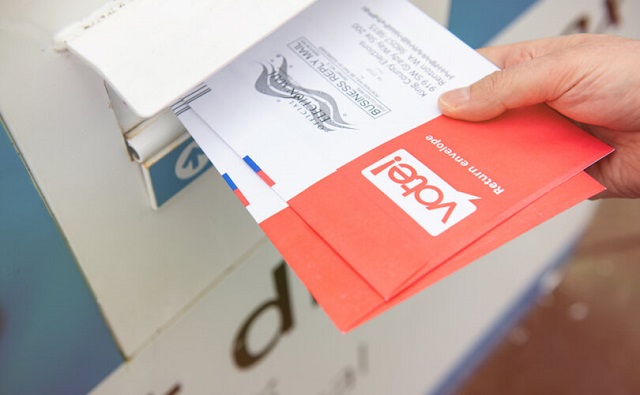
From LifeSiteNews
21% of mail-in voters admitted to illegally filling out a ballot on someone else’s behalf, and 17% admitted to voting from a state where they are not a legal resident.
One-fifth of voters who cast mail-in ballots during the 2020 presidential election admitted to committing at least one kind of voter fraud, according to the results of a recent poll conducted by Rasmussen Reports and The Heartland Institute.
Tucker Carlson posted to X on Friday an excerpt of a discussion with Justin Haskins, director of the Socialism Research Center at the Heartland Institute, in which Haskins explained how a poll conducted together with Rasmussen Reports revealed widespread illegal voter activity among mail-in voters during the 2020 election. The poll was first published in December, 2023.
About one in five mail-in ballots in the last election was fraudulent, handing Biden the presidency. We know this because the people who committed the fraud have admitted it in a new poll. pic.twitter.com/fxHL9hT4sw
— Tucker Carlson (@TuckerCarlson) April 26, 2024
Respondents who indicated that they voted by mail in the 2020 election were asked a series of questions probing for illegal, fraudulent activity, although the questions did not explicitly label these activities as “fraud.”
“For example, we asked people, ‘Did you vote in a state where you’re no longer a legal resident? If you’re not a permanent resident of a state, you can’t vote there. 17% of people, nearly one in five, said yes,” Haskins told Carlson.
He further shared that 21% of mail-in voters admitted to filling out a ballot on behalf of someone else, another illegal activity, and 17% admitted to forging a signature on someone else’s behalf, “with or without their permission.”
“So all told, it’s at least one in five mail-in ballots involved some kind of fraudulent activity,” said Haskins.
Of all voter respondents — both those who voted by mail and those who voted in person —10% said that “a friend, family member, co-worker, or other acquaintance” admitted to them that they voted by mail in a state other than the one they are registered in as their state of permanent residence.
“The results of this survey are nothing short of stunning,” Haskins remarked following the poll results. “For the past three years, Americans have repeatedly been told that the 2020 election was the most secure in history. But if this poll’s findings are reflective of reality, the exact opposite is true. This conclusion isn’t based on conspiracy theories or suspect evidence, but rather from the responses made directly by the voters themselves.”
“A democratic republic cannot survive if election laws allow voters to commit fraud easily, and that’s exactly what occurred during the 2020 election,” he continued. “Although some progress has been made in more than a dozen states since the conclusion of the 2020 election, much more work is needed in most regions of the United States. If America’s election laws do not improve soon, voters and politicians will continue to question the truthfulness and fairness of all future elections.”
Carlson pointed out that claims that the 2020 presidential election results were based on fraudulent votes are considered a “criminal offense” now in the U.S., at least to the extent that “that crime appears to form the basis of one of Trump’s pending indictments.” The indictment in question claims that Trump used “false claims of election fraud to obstruct the federal government function by which those results are collected, counted, and certified.”
Mounds of evidence of fraud in the 2020 general election have emerged, but this has been widely ignored by the mainstream media.
For example, in 2022, a peer-reviewed paper from accomplished economist and former senior researcher for the Department of Justice (DOJ), John Lott, compiled statistical evidence of voter fraud in the 2020 election, specifically, of about “255,000 excess votes (possibly as many as 368,000) for Joe Biden in six swing states where Donald Trump lodged accusations of fraud.”
Batches of votes that were suspiciously tallied overwhelmingly for Biden were reported the night of the election, reversing a former Trump lead in states like Pennsylvania and Wisconsin. And before the election, Project Veritas released a video showing voters being bribed and coaxed to vote for Democrats, including by changing their votes on the ballot.
-

 espionage2 days ago
espionage2 days agoBiden expands government’s power to spy on Americans without a warrant
-

 Censorship Industrial Complex2 days ago
Censorship Industrial Complex2 days agoInternet censorship laws lead a majority of Canadians to believe free speech is threatened: poll
-

 COVID-192 days ago
COVID-192 days agoBritish MP Andrew Bridgen gives powerful speech on ‘scandal’ of excess deaths after COVID jab rollout
-

 Fraser Institute2 days ago
Fraser Institute2 days agoPolicymakers in Ottawa and Edmonton maintain broken health-care system
-

 MAiD1 day ago
MAiD1 day agoEven Canadian leftists are starting to recognize the ‘dystopian’ nature of MAiD
-

 Censorship Industrial Complex1 day ago
Censorship Industrial Complex1 day agoElon Musk skewers Trudeau gov’t Online Harms bill as ‘insane’ for targeting speech retroactively
-
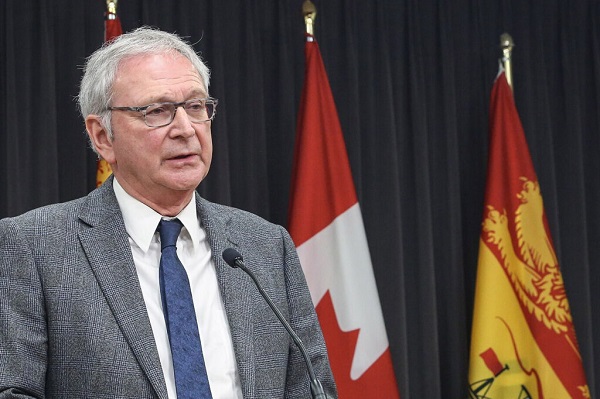
 Alberta1 day ago
Alberta1 day agoParent and gender dysphoria groups granted intervenor status in New Brunswick school policy case
-

 City of Red Deer11 hours ago
City of Red Deer11 hours agoCity presses ‘pause button’ on search for homeless shelter location

